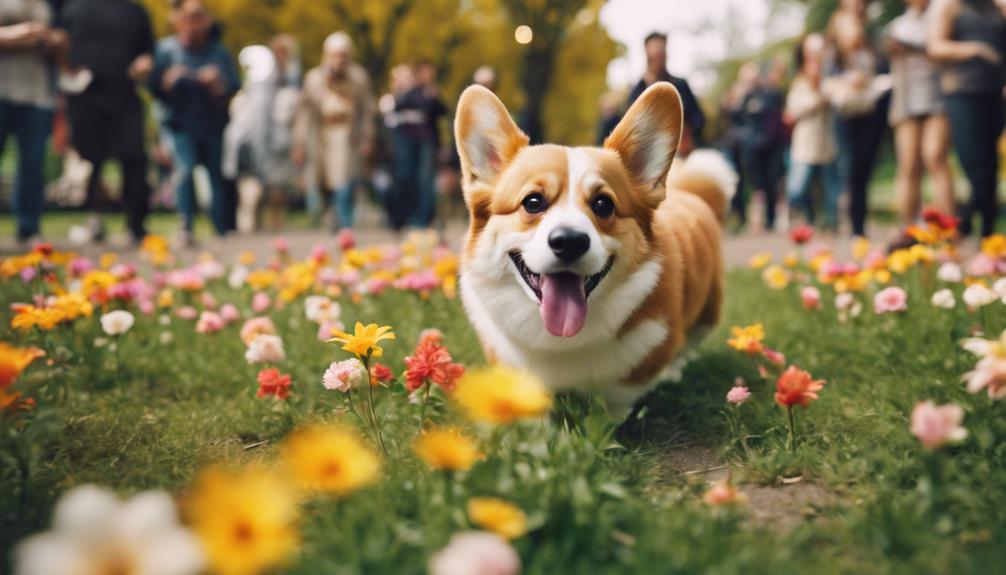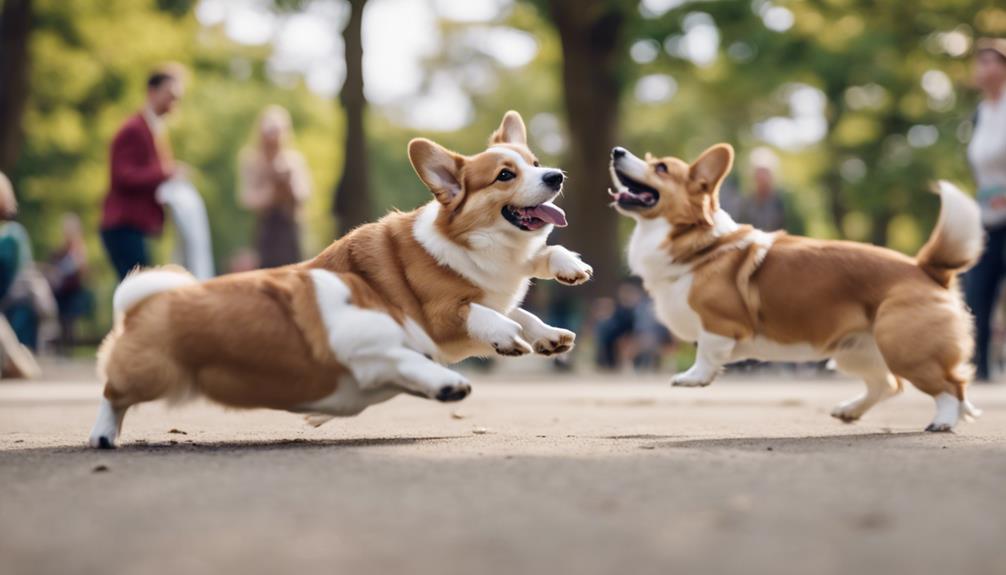Corgis, known for their distinct personalities, exhibit a range of behaviors that can fluctuate dramatically depending on their surroundings. Factors such as the home environment, social interactions, and even public stimuli can significantly influence their responses. While a familiar setting may evoke confidence and security, new experiences can trigger anxiety or excitement. Understanding these behavioral variations not only enhances our interaction with these dogs but also raises questions about the underlying mechanisms at play. What specific influences are most impactful in shaping a Corgi's behavior across different environments?
Home Environment Dynamics

The home environment significantly influences Corgi behavior, shaping their social interactions and overall well-being.
A structured routine helps Corgis feel secure and understand what to expect each day. Consistent home routines, such as feeding, walking, and playtime, establish a sense of stability.
Furthermore, environmental enrichment is crucial for their mental stimulation and physical health. This can include interactive toys, puzzle feeders, and varied walking routes that engage their curiosity. Providing a rich environment allows Corgis to explore, learn, and express their natural instincts.
Socialization With Other Pets
A well-structured home environment not only benefits Corgis but also plays a pivotal role in their socialization with other pets, as positive interactions can significantly enhance their behavioral development.
Corgis have unique playtime preferences, often enjoying activities that involve chasing or wrestling. These preferences can influence their relationships with other pets, encouraging cooperative play or, conversely, leading to territorial behavior if not managed properly.
To foster healthy socialization, owners should:
- Introduce pets gradually to minimize stress.
- Monitor interactions to ensure safety and comfort.
Interaction With Strangers

Corgis often display a range of reactions when interacting with strangers, varying from curiosity and friendliness to wariness and protective behavior. This variability can be influenced by factors such as socialization experiences and individual temperament. Some Corgis may exhibit stranger anxiety, leading them to be cautious or hesitant around unfamiliar people. In contrast, others may approach strangers with enthusiasm, showcasing their playful nature.
Understanding social cues is crucial for both Corgis and their owners; recognizing when a dog feels anxious or threatened can help prevent negative interactions. For instance, a Corgi that lowers its ears or avoids eye contact may be signaling discomfort.
Owners should encourage positive encounters to foster confident behaviors and reduce anxiety when meeting new people.
Response to Family Members
Understanding how Corgis respond to family members is essential for fostering a positive home environment.
These dogs often exhibit unique behaviors influenced by their familiarity with family dynamics, which can affect their interactions with visitors.
Familiarity With Family Dynamics
Family dynamics play a crucial role in shaping how Corgis respond to individual members, influencing their behavior and interactions.
A Corgi's cognitive development is closely linked to its experiences within the family, as these interactions help the dog learn social cues and appropriate responses.
Emotional attachment also plays a significant part; Corgis often form strong bonds with family members, which can lead to protective or affectionate behaviors.
For example:
- Corgis may display loyalty to a primary caregiver.
Understanding these dynamics can help owners create a nurturing environment, allowing their Corgis to thrive emotionally and socially, enhancing the overall family experience.
Interaction With Visitors
The interaction of Corgis with visitors reveals their unique responses to different family members, often influenced by established relationships and social dynamics within the household.
When a visitor arrives, Corgis may exhibit visitor anxiety, especially if they are unfamiliar with the person. This anxiety can manifest as barking or cautious behavior.
Conversely, when greeting family members, Corgis typically display playful greetings, characterized by wagging tails and excited jumps. These behaviors highlight the Corgi's ability to differentiate between familiar and unfamiliar individuals.
Understanding these responses is vital for fostering positive interactions. Owners can help ease visitor anxiety by encouraging calm introductions, allowing the Corgi to feel secure and welcomed during encounters with guests.
Behavior in Public Spaces

While in public spaces, Corgis often exhibit a mix of curiosity and playfulness, making them both engaging and sometimes challenging companions for their owners. Their public behavior can vary significantly, influenced by their surroundings and social interactions.
For instance, Corgis may become overly excited when encountering new people or other dogs, leading to strong leash reactions. This can manifest as pulling or barking, which may surprise or frustrate their handlers.
Owners should be prepared to manage these behaviors by using proper leash techniques and commands. Additionally, socialization is crucial for Corgis, helping them acclimate to bustling environments.
Effects of Noise and Distractions
Noise and distractions in various environments can significantly impact a Corgi's behavior, leading to heightened anxiety or excitement that may challenge their ability to focus and engage with their owners. Corgis are known to exhibit varying levels of noise sensitivity and distraction tolerance, which can influence their reactions in different settings.
Factors that can affect their behavior include:
- Loud sounds: Fireworks or thunder can trigger anxiety in sensitive Corgis.
- Crowded spaces: Large groups of people may overwhelm them, reducing their ability to concentrate.
Understanding these effects is vital for creating comfortable environments that promote positive behavior in Corgis.
Variations in Training Settings

Training settings for Corgis can significantly influence their behavior and learning outcomes.
Home training dynamics often provide a comfortable environment, allowing for personalized attention.
Socialization impact factors, such as exposure to other dogs and people, are crucial for developing well-rounded pets.
Understanding these variations helps owners create effective training plans tailored to their Corgi's needs.
Home Training Dynamics
Home environments present unique dynamics that can significantly influence the effectiveness of training techniques for Corgis, depending on factors such as space, distractions, and the presence of other pets or family members.
To achieve successful training, it is essential to incorporate positive reinforcement and maintain training consistency. These elements help Corgis understand desired behaviors and create a stable learning environment.
- Space Limitations: Smaller areas may restrict movement and exploration, affecting training outcomes.
- Distractions: Noisy or busy households can hinder focus and make training sessions less effective.
Understanding these dynamics can lead to more effective training strategies tailored to the home environment.
Socialization Impact Factors
Variations in training settings play a crucial role in shaping a Corgi's socialization experiences, influencing their ability to adapt to different environments and interact effectively with other animals and people.
Different settings provide unique social exposure, allowing Corgis to encounter a variety of sights, sounds, and scents. For example, training in a busy park can enhance their comfort around larger crowds, while quieter settings may help them focus better on commands.
Behavioral reinforcement, which involves rewarding positive behaviors, is also vital in these settings. By consistently rewarding Corgis for appropriate interactions, owners can strengthen desirable behaviors.
Therefore, a well-rounded training approach, incorporating diverse environments and reinforcement strategies, is essential for fostering well-socialized and adaptable Corgis.
Influence of Weather Conditions
Understanding how weather conditions affect Corgi behavior is essential for ensuring their well-being and optimal social interaction. Weather impact plays a significant role in shaping Corgis' seasonal behavior.
For example, extreme heat may lead to lethargy, while cold temperatures can motivate them to seek warmth and comfort. Additionally, rainy days may deter outdoor activities, causing restlessness.
Corgis tend to be more active in moderate temperatures.
Rainy weather can lead to increased indoor playfulness.
Hot days may result in decreased energy levels.
Age and Maturity Factors

Aging and maturity significantly influence Corgi behavior, affecting their energy levels, sociability, and adaptability to various environments.
During puppy development, Corgis are typically energetic and curious, often displaying a playful demeanor. This stage is crucial for socialization and learning, as positive interactions can shape their future behavior.
As Corgis transition into adulthood, their energy may stabilize, leading to a more balanced temperament.
In contrast, senior behavior can exhibit a decline in energy and an increased preference for calm settings. Older Corgis may become less sociable and more cautious, as they adapt to physical limitations.
Understanding these developmental stages helps owners provide appropriate care, ensuring happier and healthier Corgis throughout their lives.

